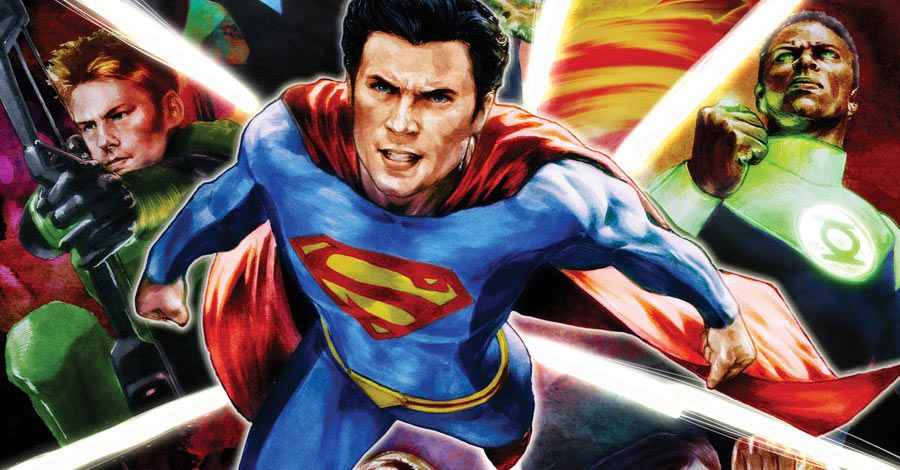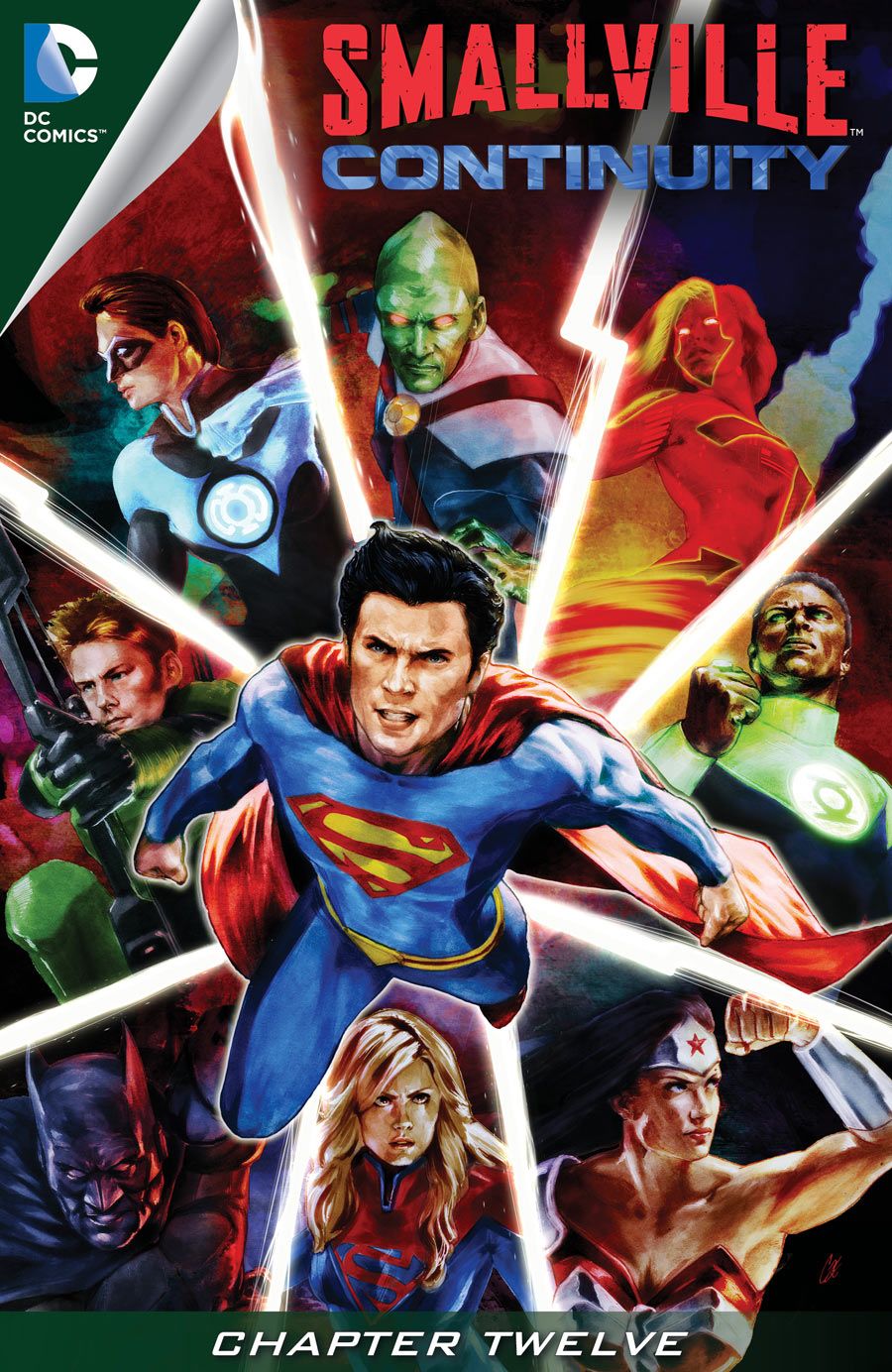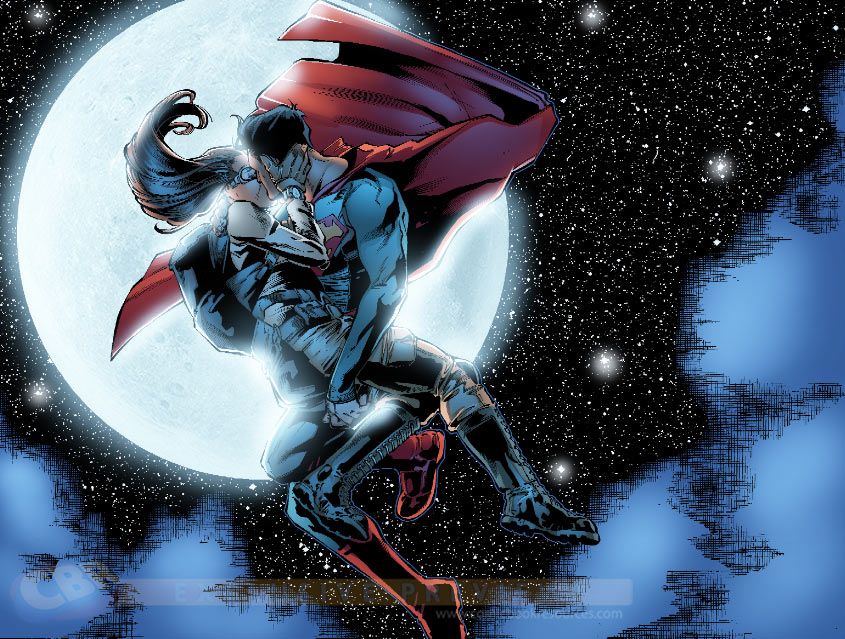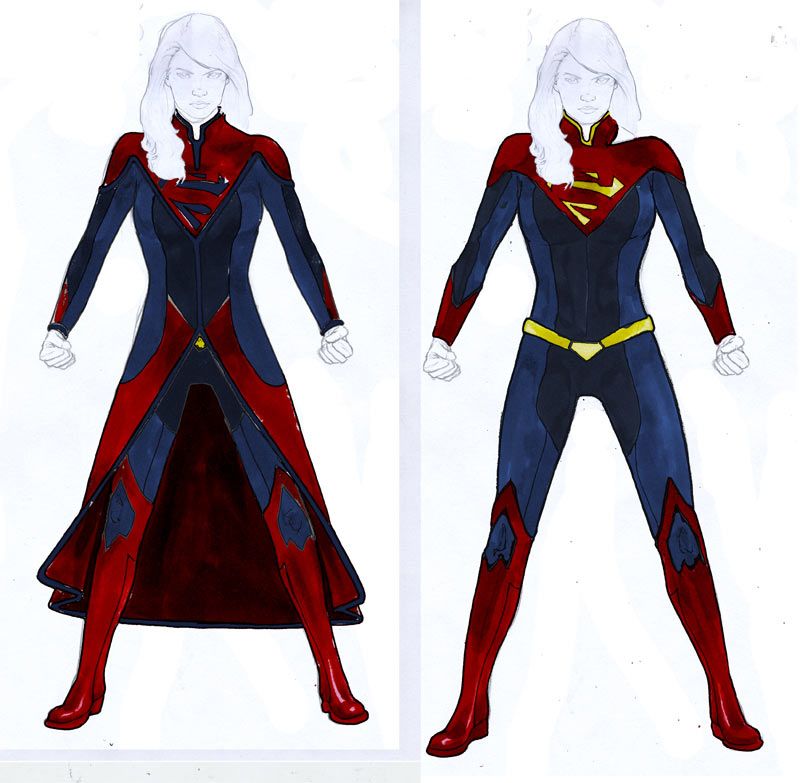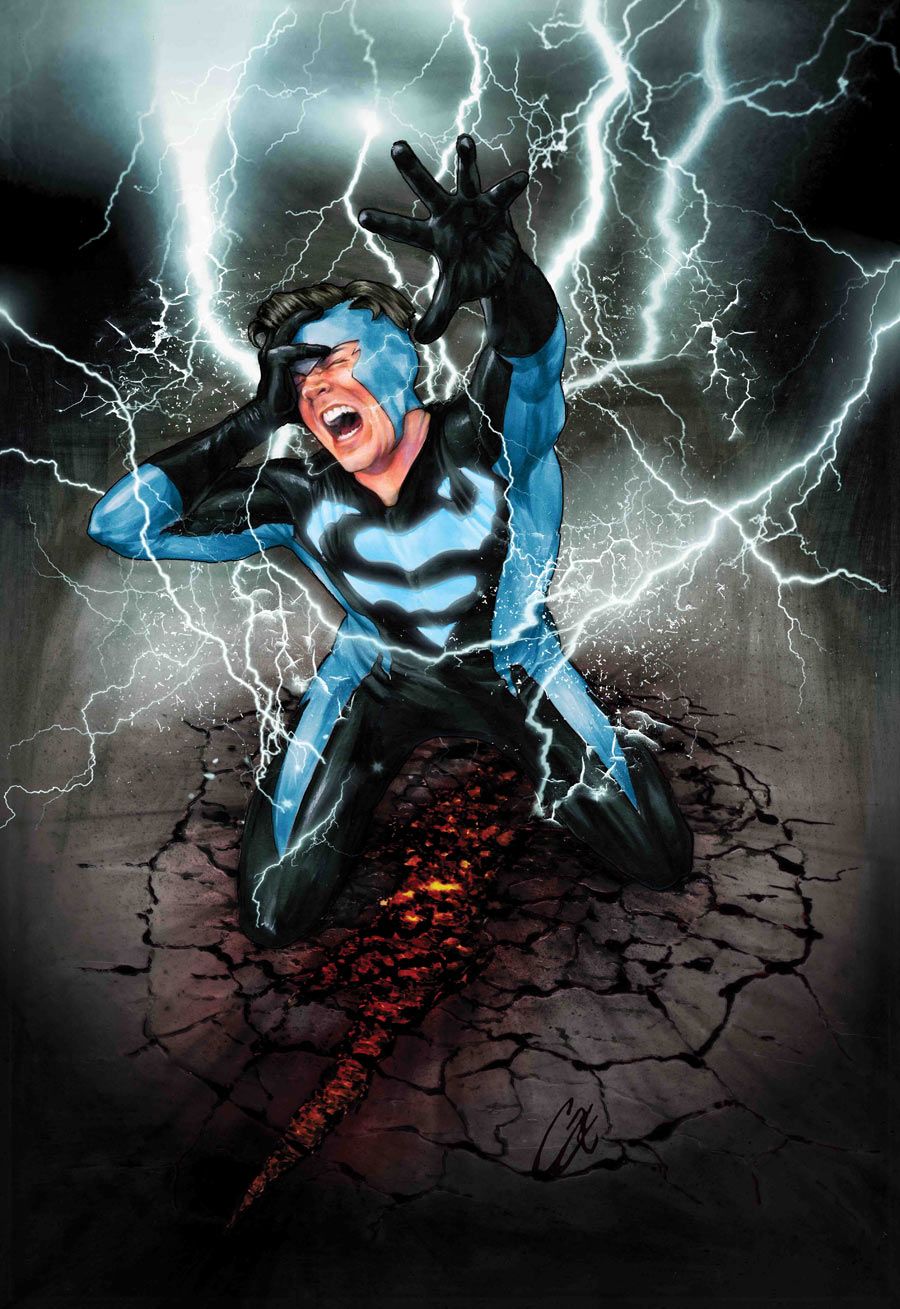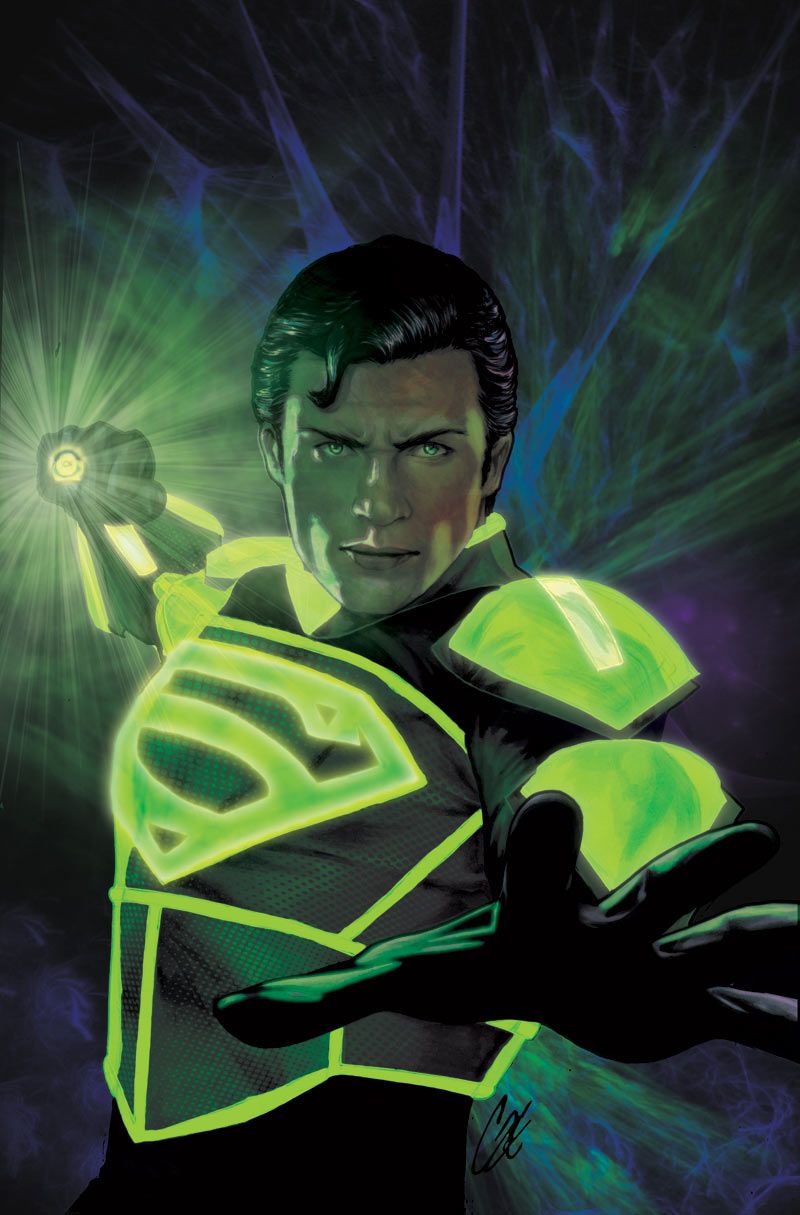After enjoying a 10-season run on television, "Smallville" made the leap to digital comics in May 2012 with the launch of "Smallville Season 11." And with the final chapter of what's believed to be the final story of the series available digitally today, CBR News connected with writer Bryan Q. Miller and cover artist Cat Staggs to discuss the epic ending.
Miller, who wrote all 119 chapters of the series (which equals 40 issues worth of the comic book stories), started his run on "Smallville" in 2004 when he joined the popular TV series as intern during Season Five. He was hired as a writers' assistant for Season Seven, and after completing the WB Writers' Workshop was promoted to staff writer for Season Eight. By the time "Smallville" completed its 218-episode run with Season 10, he was serving as Executive Story Editor.
Staggs, likewise, has grown to prominence during her run as cover artist for "Smallville Season 11." From start to finale, she has provided the series every one of its painted covers, defining Tom Welling's version of Superman for fans, designing Kara's Supergirl costume and giving the "Smallville" version of the DCU its visual identity.
As "Smallville Season 11" heads to its conclusion, Miller and Staggs share their closing thoughts on their epic run, including how they perceived Superman's growth over the course of the comic, some of their favorite moments and characters and why Lex Luthor is so perfectly opposite Clark Kent.
CBR News: Q, you started on "Smallville" when it was still a TV series, but during the past two-and-a-half years, you've expanded the mythos via digital comics. Clark obviously grew an incredible amount during the first 10 seasons of the TV series but can you talk about his growth as a character -- and as Superman -- during "Smallville Season 11"?
Bryan Q. Miller: The biggest moment for Clark in the television series was showing his face to the world as a hero. The biggest moment for him in the comic continuation is revealing to the world that the face they've come to know as their champion is that of an alien. And, after the events of the Apokolips invasion at the end of Season 10, that's a very dangerous thing to do. If there's one thing the world can agree on in the comic, it's that alien equals dangerous.
In "Smallville Season 11," Clark came to terms with being representative of something larger than heroism -- he's proof that we are not alone in the universe. And, for good or ill, when those from beyond, to whom human law does not apply, visit us, they need protection and representation. And Superman can -- and should -- do that. Clark's sense of responsibility broadened for the better over the course of "Season 11." And, fortunately, he's fostered and nurtured and brought together a new generation of heroes to help him out when things get rough.
On the TV series, dealing with super-threats fell onto Clark's shoulders and Clark's alone. Now, in a world post-Apokolips, he knows he has family and friends to call on for help, counsel, etc. He's grown into a patriarch and the leader of the Justice League. He's created his own family of a sort, which is the next phase of anyone's adult life.
In the 10th chapter of "Continuity," a Monitor asked Superman to kill her but he tells her he can't. Is this a nod to the ending of "Man of Steel," and if so, what does it say about your vision of Clark/Superman, which is obviously inspired by Tom Welling's performance?
Miller: Our Clark took a few lives over the course of his 10-season journey to becoming his own Man of Steel, and each time, he felt guilt, remorse and loss. By exploring Clark's relationship with death, life and morality in a TV series over a decade long, we were really able to give him a firm footing for his stance on preserving life at all costs in "Season 11." Does that speak to what I think Superman should and shouldn't be? Absolutely.
What about you, Cat? How has your visual version of Superman evolved during the run?
Cat Staggs: Since the book takes place after the series, once Clark has embraced his Super alter ego, I wanted to convey a full-blown Superman. I also wanted to try and hold some of the essence from the show for the fans migrating from TV to comics, so it was a delicate balance. As the character developed throughout the run I wanted the imagery to, as well. Bryan wrote a strong, and from the heart, Superman and I did my best to get that across on the page.
Can the same be said of Clark?
Staggs: Yes. Though I didn't really get to depict him very often, I applied the same technique.
As much as "Smallville" is Clark's journey, Lex has also developed exponentially. "Continuity" features teases of a potential life in politics, which dates back to to "Smallville" Season One, and is finally revealed in Season 10 as coming to realization in 2018. Have you enjoyed writing Lex in "Season 11?" What is it about this Michael Rosenbaum-influenced version of the character that works so well opposite Clark/Superman?
Miller: At the end of "Smallville" Season 10, Lex got slammed with some sci-fi-plot-whammy-amnesia. But what remained into Season 11 was an instinctual hatred and distrust of Superman, specifically the S-shield, which he knew full-well was associated with Clark, who betrayed their friendship over the course of series. Having a Lex sitting on top of a pile of money, saddled with a hero complex and a mysterious hatred for Superman that even he didn't understand was a fantastic sandbox to play in with that character for Season 11.
The great shift we got to play with on the traditional Superman/Lex dynamic, especially in the first half of "Smallville Season 11" is that Clark knows more about Lex than Lex does about himself. Which is bittersweet and sad but also adds a sense of danger to the proceedings. When is Lex going to revert? What happens if Lex learns about Superman again? But Lex can't operate in a vacuum, which is why we have O-T-I-S, Otis.
The Lex/Otis bromance, and it was a bromance, is easily a tie for me in relationship-writing in Season 11. The other, of course, being Lois and Clark.
I am thinking specifically about "Continuity" but which character featured in "Smallville: Season 11" did you enjoy exploring best and telling his or her story? My fingers are crossed for you to say Zan and Jayna.
Miller: I'm not going to lie to you. Getting to hunker down and write that "Titans" one-shot featuring the Smallville versions of those characters and picking up the Wonder Twins from Season 9 was a blast. A little Teen Titans arc was my first gig with DC, after all. But, all things being equal, I'd have to say Wonder Woman in "Olympus." That take on her origin and adventure into man's world had been brewing in the old brain kitchen for quite a while, and it was awesome to be able to tell it and share it and see it realized with art.
Cat, any personal favorites that you really enjoyed drawing?
Staggs: Has to be Kara/Supergirl. I was lucky enough to be asked to design her costume for this series and it was a dream come true. Any chance I had to draw her and the suit in action was a great day at the drawing table.
"Season 11" has come to close with "Continuity" -- arguably your biggest (and most jam-packed) arc yet. Were the events and character appearances that you delivered during this final arc, planned all long or were some added organically as the story materialized?
Miller: A few moments emerged organically as I outlined the first half of the arc, but I worked backwards. The last 30 pages, specifically the final 15, have been set in stone for a while. The season was always going to end with these final moments, from the very beginning.
Kitty Kowalski, Jack Ryder, Nanda Parbat -- the Easter eggs for long-time DC comic book readers are endless in this final arc. Is there one that pleases you most? And one that you weren't able to get in?
Miller: I had to cut a scene or two, but all of our little nods and winks made the final cut. I think I'm happiest with our nudge toward/diversion from traditional Gotham continuity towards the very end.
We've talked about this before but obviously telling "Smallville" stories in comics versus television allows for bigger, better, badder "special effects." Can you talk about the artists that have visually told "Smallville: Season 11," which most recently included Ig Guara and Marcelo Di Chiara and on covers, the the uber-talented Cat Staggs?
Miller: Marcelo came in to lend a hand in a big way. I gave Ig a ton of work to do with "Continuity," and we're grateful for it. And then Ig came in to lend a hand when Marcio needed a little bit of help completing the madness that was our "Lantern" arc. The schedule on these weeklies is simply crushing. That any of our artists ever managed to complete a full 120 on their own is somewhat beyond my comprehension, and I salute everyone involved. Just as Ig and Marcelo had to juggle a massive 60-page Justice League vs. Monitor army battle, my dearest Cat had the unenviable task of creating four final covers that not only included everyone we possibly could, but also stood on their own and didn't give anything away about the finale's plot. Faces and expressions are very important to me and how I work, and all three of these talented folks really nailed it -- on interior and exterior.
Throughout the whole season, each artist got to bring their own visual style and flair to the proceedings, which I love, because, much like the show, it gave each episode its own distinct feel, mood and tone. The list of artists on pencils, inks, colors, letters is huge. We churned out a massive amount of content, and I'm grateful to have met and worked with so many talented people during our run.
Cat, did you have a favorite cover?
Staggs: This is hard. It's like asking me to pick my favorite kid. As much as I liked being able to come full circle with the first and last covers, if I had to choose I think it would be "Lantern" #4, followed closely by "Lantern" #1 and "Haunted" #4. I feel like those came together like you want a piece to do. When it makes it from your head to the page with a smooth transition that is a good day.
Not sure what you can reveal about the final issue, but will all of the storylines finish, wrapped neatly with little bows, or are you leaving some loose ends for a potential "Smallville: Season 12"?
Miller: I'm a big fan of wrapping things up in neat little bows. I have an entire playlist on my laptop called "Endings," which is just the final pieces of music from a bunch of different scores. Cliffhangers are great, but if you can really, truly wrap something up and close it off -- finish your sentence/make your point -- it's a magical thing. And I hope we've done that for readers with this final week of "Continuity."
Will we see "Smallville Season 12"?
Miller: All gathered, corroborated intelligence points to Friday's final chapter of "Continuity" being the finale-finale of "Smallville." We've told our story and managed to jump mediums from television to comics in the process. "Smallville" has done just fine by itself. Ten years of television and 40 issues of comics is nothing to shake a stick at.

